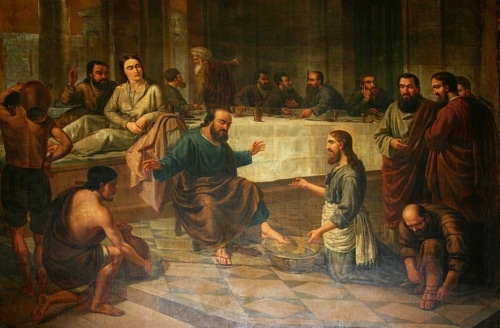The 13th chapter of John has a fascinating account of Jesus washing his disciple’s feet.
Before the Passover Festival, Jesus knew that His hour had come to depart from this world to the Father. Having loved His own who were in the world, He loved them to the end.
Now by the time of supper, the Devil had already put it into the heart of Judas, Simon Iscariot’s son, to betray Him. Jesus knew that the Father had given everything into His hands, that He had come from God, and that He was going back to God. So He got up from supper, laid aside His robe, took a towel, and tied it around Himself. Next, He poured water into a basin and began to wash His disciples’ feet and to dry them with the towel tied around Him.
He came to Simon Peter, who asked Him, “Lord, are You going to wash my feet?”
Jesus answered him, “What I’m doing you don’t understand now, but afterward you will know.”
“You will never wash my feet—ever!” Peter said.
Jesus replied, “If I don’t wash you, you have no part with Me.”
Simon Peter said to Him, “Lord, not only my feet, but also my hands and my head.”
“One who has bathed,” Jesus told him, “ doesn’t need to wash anything except his feet, but he is completely clean. You are clean, but not all of you.” For He knew who would betray Him. This is why He said, “You are not all clean.”
When Jesus had washed their feet and put on His robe, He reclined again and said to them, “Do you know what I have done for you? You call Me Teacher and Lord. This is well said, for I am. So if I, your Lord and Teacher, have washed your feet, you also ought to wash one another’s feet. For I have given you an example that you also should do just as I have done for you.
John 13:1-15 NIV
Jesus Took the Servant’s Role
This story seems strange in modern American culture but would not have been in 1st-century Palestine. Sandals were worn on dusty streets. A sign of hospitality was to offer a guest the opportunity to wash the dust off their feet or to have a servant do it for them. It was no stranger to them than providing a drink to visitors in our homes today.
What was strange about this was that instead of having a servant wash their feet, the master did it himself. And the disciples, Peter, in particular, protested this breach of social etiquette. But Jesus had a lesson he had been unsuccessfully trying to teach them, and this was another attempt to get them to understand that greatness in the Kingdom of God is based on service rather than being served. And so he takes the very visible step of garbing like a servant and performing a servant’s task for his disciples.
And it makes for an interesting story. Until verse 15 shows up. There, Jesus tells his disciples that they should follow his example. And that probably includes his disciples from today. Including me. Washing someone else’s stinky feet. And maybe even worse. Letting someone else wash my feet.
How Should I Respond To This?
Now I have had the opportunity a couple of times to wash the feet of a group of believers. And I believe it was more difficult for the washees than the washer. Our culture seems to have an aversion to having someone play with your feet. Assuming, of course, they can even get to them through the shoes, socks, and pantyhose. And yet Jesus clearly tells us to follow his example.
Maybe, instead of wrestling with people to get their shoes off and feet into the pot of water; or just ignoring the whole thing as an outdated and unrealistic expectation, we should look beyond the specifics of foot washing and deal with the more general principle of servanthood that Jesus is trying to teach.
Do you ever catch yourself thinking, “That’s someone else’s job,” or “Someone needs to _____” (fill in the blank with sweep / mow / pick up trash / straighten the chairs / clean the toilet / help old Mrs. Smith to her seat)? If so, you may have discovered how to wash someone else’s feet. Sweep a dirty floor, keep a lawn mowed, pick up any trash you see, help the old lady to her seat, . . . . Adopt a servant’s heart, follow Jesus’ example, and become great in the kingdom.
Related Posts
Disclaimer
The views expressed here are solely mine and do not necessarily reflect those of any other person, group, or organization. While I believe they reflect the teachings of the Bible, I am a fallible human and subject to misunderstanding. Please feel free to leave any comments or questions about this post in the comments section below. I am always interested in your feedback.
If you have found value in this post, please consider subscribing to A Clay Jar so that you don’t miss any other posts.

